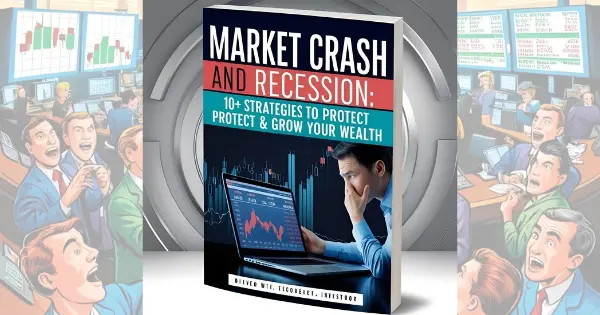Market crashes and long recessions are inevitable parts of the economic cycle. While they can trigger panic and significant financial losses, they also present unique opportunities for those who are prepared and adopt smart market crash recession strategies. This article delves into actionable strategies for both investors and individuals to not only survive but potentially thrive during such tumultuous times. Understanding the psychology of downturns and maintaining a long-term perspective are crucial for navigating these challenging periods successfully.
Understanding the Economic Landscape: Crash vs. Recession
Before diving into effective market crash recession strategies, it’s vital to differentiate between these two terms.
- Market Crash: This is a sudden, often dramatic, drop in stock prices. It can be triggered by various factors like geopolitical events, asset bubbles bursting, or sudden shifts in market sentiment. Crashes are typically short-lived but can erase significant wealth quickly.
- Recession: This is a more prolonged economic downturn characterized by a significant decline in economic activity, typically measured by a fall in GDP, rising unemployment, and reduced consumer spending. Recessions can last for months or even years, impacting a broader range of financial aspects beyond just stock markets.
Often, a market crash can precede or accompany a recession, as investor confidence plummets alongside broader economic concerns. Remember, governments and central banks often step in with monetary and fiscal stimulus packages to stabilize the economy during such times, which eventually aids in recovery, reinforcing the need for sound market crash recession strategies.

Core Principles for Financial Resilience: Essential Market Crash Recession Strategies
Regardless of your investment horizon or financial situation, certain core principles form the bedrock of resilience during an economic downturn and are key market crash recession strategies.
- Don’t Panic and Avoid Emotional Decisions: Emotional decisions are almost always bad financial decisions. During a crash, the urge to sell everything can be overwhelming. Resist it. History, from the Dot-Com bubble to the 2008 financial crisis and the COVID-19 pandemic, repeatedly shows that markets recover, rewarding patient investors. This is a fundamental part of successful market crash recession strategies.
- How to Avoid Emotional Decisions:
- Stick to a Pre-determined Plan: Have a clear investment and financial plan in place. This acts as a roadmap, guiding your actions rather than reacting to market noise.
- Step Away from Short-Term Market Noise: Constantly checking your portfolio or following every news headline can amplify fear. Limit your exposure to daily fluctuations.
- Focus on Long-Term Goals: Remind yourself of your long-term financial objectives. Short-term volatility is less significant when viewed through a decades-long lens.
- Practice Mindfulness: Techniques like meditation or simply taking a break can help manage stress and clear your mind for rational decision-making.
- Talk to a Trusted Advisor: A financial advisor can provide an objective, unemotional perspective, helping you stick to your plan.
- How to Avoid Emotional Decisions:

- Maintain a Long-Term Perspective: For long-term investors, market downturns are often temporary blips on a much larger growth curve. Focus on your long-term financial goals, not daily market fluctuations. This long-term view is critical for effective market crash recession strategies.
- Review and Adjust, Don’t Abandon: Your financial plan might need adjustments, but it shouldn’t be discarded. Revisit your risk tolerance, asset allocation, and goals. Adapting your plan is one of the smart market crash recession strategies.
Key Market Crash Recession Strategies for Investors
For those with existing investments or capital to deploy, a market downturn offers distinct opportunities. Implementing sound market crash recession strategies is vital.
- Rebalance Your Portfolio: A market crash can significantly alter your portfolio’s asset allocation. If stocks have fallen sharply, they might now represent a smaller percentage of your overall portfolio than originally intended. Rebalancing involves selling some of the assets that have performed well (e.g., bonds) and buying more of those that have fallen (e.g., stocks) to bring your portfolio back to its target allocation. This is essentially buying low and selling high.
- Dollar-Cost Averaging (DCA): If you have a steady income, continue investing a fixed amount of money at regular intervals, regardless of market fluctuations. This strategy, known as Dollar-Cost Averaging (DCA), means you buy more shares when prices are low and fewer when prices are high. Over time, it can lead to a lower average cost per share and significant returns when the market recovers. Remember, market crashes are often opportunities to buy quality assets at a discount, a key element of effective market crash recession strategies.
- Focus on Quality Companies: During a downturn, weaker companies struggle, but strong, fundamentally sound businesses often weather the storm better and recover faster. Look for companies with:
- Strong balance sheets and low debt.
- Consistent profitability and positive cash flow.
- Dominant market position and competitive advantages.
- Essential products or services.
- Reliable dividends (if applicable).
- Explore Diversification Beyond Equities: While diversification is always important, it becomes critical during a recession. Consider assets that traditionally perform well or offer stability when stocks are volatile:
- Bonds: Government bonds (especially high-rated ones) are often seen as safe havens. Corporate bonds from highly rated companies can also provide stable income.
- Gold and Precious Metals: Often considered a store of value during economic uncertainty.
- Cash: Holding some cash provides liquidity for emergencies and opportunities to buy distressed assets.
- Real Estate (Carefully): While often illiquid, some segments of real estate (e.g., essential housing, defensive commercial properties) might offer stability or long-term growth opportunities, though this can be volatile.

- How to Hedge Your Portfolio: Hedging strategies are designed to reduce the risk of adverse price movements in an asset. While often complex, here are basic concepts:
- Buying Put Options: This involves purchasing a contract that gives you the right (but not the obligation) to sell a stock at a predetermined price. If the stock price falls, the value of your put option increases, offsetting losses in your stock holdings.
- Short Selling: This involves borrowing shares and selling them, with the expectation of buying them back at a lower price later and profiting from the difference. This is a high-risk strategy and should only be undertaken by experienced investors.
- Investing in Inverse ETFs: These exchange-traded funds aim to move in the opposite direction of a particular index or sector.
- Utilizing Defensive Assets: As mentioned, assets like gold and certain bonds can act as a natural hedge against equity market downturns.
- Caution: Hedging can be costly and complex. It’s crucial to understand the mechanics and risks involved. For most retail investors, diversification and a long-term perspective are often more suitable than direct hedging. Consult a financial advisor for advanced market crash recession strategies.

- Consider Tax-Loss Harvesting: If you have investments that have fallen significantly, you might be able to sell them to realize a loss, which can then be used to offset capital gains or a limited amount of ordinary income. This strategy, known as tax-loss harvesting, can reduce your tax liability while allowing you to reinvest the proceeds in similar (but not identical) assets. Consult a tax advisor for specifics on market crash recession strategies related to taxes.
- Should I Close My Demat Account? (No, Generally Not): A common panic reaction during a market crash is to consider closing your Demat (dematerialized) account, essentially exiting the stock market entirely. This is almost always a mistake for long-term investors. Avoiding this impulse is a crucial part of smart market crash recession strategies.
- Missing the Rebound: Markets typically recover from crashes. By closing your account, you guarantee missing out on the subsequent rebound and the opportunity to recover losses and profit from future growth.
- Loss Crystallization: Closing your account means you “lock in” your losses. If you don’t sell, losses are only on paper.
- Future Opportunities: Keeping your Demat account open allows you to take advantage of buying opportunities when valuations are low, employing strategies like Dollar-Cost Averaging.
- Better Strategy: Instead of closing your account, consider reducing your exposure if your risk tolerance has genuinely changed, or simply stop checking it frequently if market volatility is causing too much stress.
Effective Market Crash Recession Strategies for Personal Finance and Income Stability
Market crashes and recessions don’t just impact investments; they affect jobs, income, and overall financial security. Robust market crash recession strategies are essential here too.
- Build and Maintain an Emergency Fund: This is arguably the most crucial step. Aim for 3-6 months of living expenses in an easily accessible, liquid account (like a savings account). During a recession, job security can be tenuous, and an emergency fund provides a vital buffer against unemployment or unexpected expenses.
- Reduce and Manage Debt: High-interest debt (like credit card debt, personal loans) can be a significant burden during an economic downturn. Prioritize paying it down. If you have variable-rate loans, understand their terms and consider refinancing to fixed rates if possible. Lowering your debt obligations frees up cash flow and reduces financial stress. Focus on clearing high-interest debt first, while lower-interest loans like home mortgages might be managed differently.
- Cut Unnecessary Expenses: Review your budget with a fine-tooth comb. Identify and eliminate non-essential spending. Every dollar saved increases your financial flexibility and resilience. This might mean cutting back on dining out, subscriptions, or luxury purchases.
- Diversify Income Streams: Relying on a single income source can be risky during a recession. Explore ways to diversify your income:
- Side Hustles: Freelancing, consulting, online sales, or gig work can provide supplementary income.
- Skill Development: Acquire new new skills that are in demand, making you more valuable in the job market.
- Passive Income: Though harder to establish quickly, long-term options like rental properties (if already owned) or reliable dividend stocks can provide income.

- Enhance Employability: Update your resume, network with professionals in your field, and consider certifications or courses to boost your skills. Being proactive about your career development can offer a sense of security and open doors even in a tough job market.
- Seek Professional Financial Advice: A qualified financial advisor can provide personalized guidance tailored to your specific situation, risk tolerance, and goals. They can help you create a robust financial plan and navigate complex decisions during uncertain times.
Conclusion: Opportunity Amidst Adversity and Effective Market Crash Recession Strategies
While market crashes and long recessions are undoubtedly challenging, they are also periods of significant opportunity for those who maintain discipline and a clear strategy. By focusing on building strong financial foundations, making informed investment decisions, understanding how to manage emotions, and staying calm amidst the chaos, you can not only protect your wealth but potentially position yourself for substantial growth when the economy eventually recovers. Remember, patience, discipline, and a long-term outlook are your greatest assets during these turbulent times, forming the bedrock of successful market crash recession strategies.

2 thoughts on “Market Crash & Recession: 10+ Strategies to Protect & Grow Your Wealth”